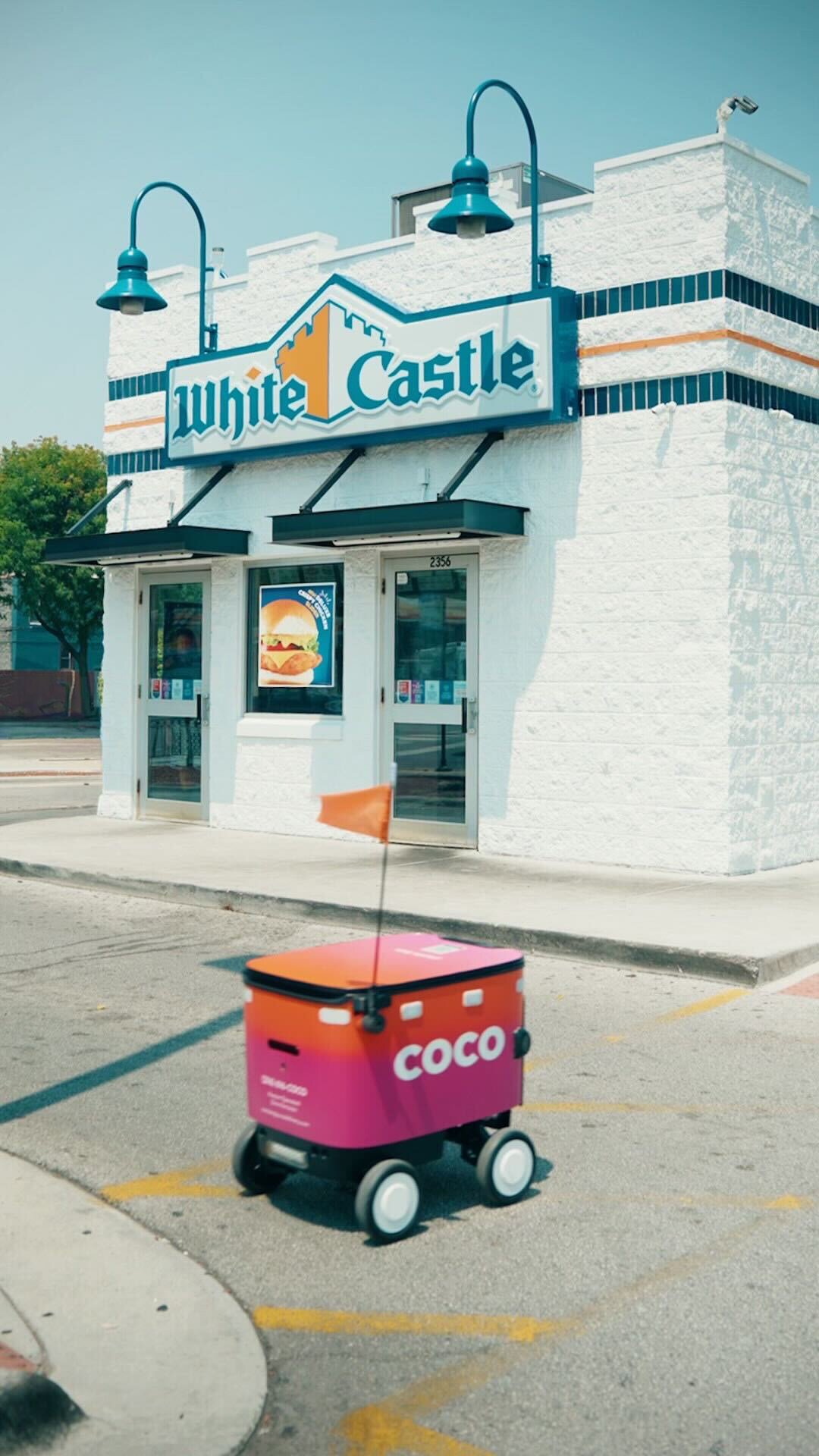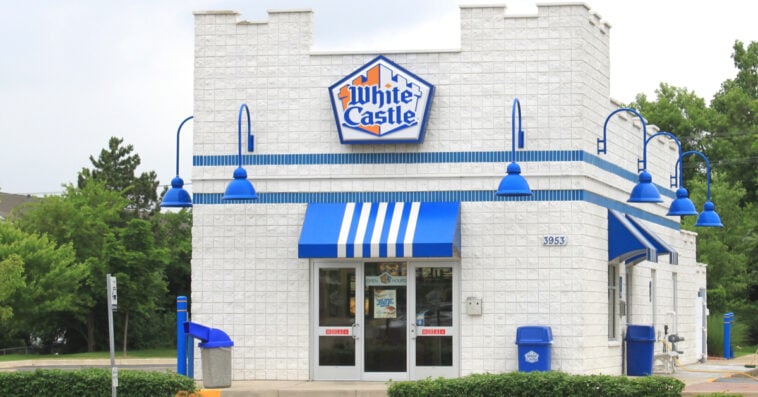Craving sliders with a side of sci-fi? White Castle just made that a reality. In a move straight out of the future, the fast-food pioneer has rolled out autonomous delivery robots in Chicago—meaning your next Crave Case could arrive curbside, not by car, but by robot. Thanks to a partnership with Coco Robotics and Checkmate, White Castle is turning heads (and filling stomachs) with a high-tech system that syncs seamlessly with Uber Eats and offers real-time tracking without any additional fee. Here’s everything we know about White Castle’s new and smarter delivery system.
White Castle Embraces Robot Delivery in Chicago Test Launch
White Castle is stepping into the future of food delivery. For the first time in its 101-year history, the iconic burger chain is testing robotic delivery in partnership with Coco Robotics, Checkmate, and Uber Eats—with the pilot program rolling out at a single high-traffic location in Chicago.
Customers placing orders through Uber Eats from the participating White Castle restaurant may be greeted by a Coco Robot instead of a human driver. When the robot reaches the destination, it sends an alert prompting the customer to meet it outside, unlock its lid via the Uber Eats app, and retrieve their meal—all without extra steps or added fees.
This pilot marks a major milestone for White Castle as it explores new ways to innovate the customer experience. By leveraging Coco’s zero-emission, autonomous sidewalk robots, the brand aims to reduce parking lot congestion, enhance order efficiency, and speed up deliveries—without compromising quality.
“This partnership is about driving smarter operations where it matters most,” said Chris Shaffery, Vice President of Operations at White Castle. “By testing Coco’s robots at a high-traffic location, we’re seeking to ease congestion, speed up service, and allow our team to stay focused on quality—helping us serve more customers, more efficiently.”

How Coco Robots Are Changing the Game in Urban Delivery
Coco Robotics is no stranger to the streets of Chicago. Since launching in the city in 2024, the company’s compact, AI-powered delivery bots have become a familiar—and increasingly welcome—sight in busy neighborhoods.
Engineered for dense urban environments, Coco’s autonomous robots have already logged more than 500,000 safe, zero-emission deliveries in major cities including Los Angeles, Miami, and Helsinki. In Chicago specifically, they’ve navigated everything from snow-packed sidewalks to cracked pavement, earning high marks for reliability, food integrity, and winter performance.
“Coco is already completing hundreds of thousands of orders, proving that autonomous food delivery is scaling rapidly,” said Melissa Fahs, Chief Commercial Officer at Coco Robotics. “By expanding our footprint through partners like Uber Eats, we’ve unlocked opportunities with national brands such as White Castle—bringing autonomous delivery to a quick-service staple that’s embracing technology to keep up with demand in high-traffic locations.”
The Brains Behind the Bots: How Checkmate and Uber Eats Keep Orders Moving
Behind the scenes of White Castle’s robotic delivery pilot is a seamless tech infrastructure powered by Checkmate (formerly ItsaCheckmate) and Uber Eats. Together, they ensure that autonomous deliveries run smoothly—from order placement to robotic handoff.
Checkmate’s integration serves as the connective tissue between White Castle’s in-store point-of-sale system, its Uber Eats menu, and Coco’s delivery robots. This real-time sync keeps orders flowing efficiently, eliminating manual entry errors and making sure everything is in lockstep.
With Coco’s autonomous bots now layered into Uber’s delivery ecosystem, restaurants like White Castle can access live delivery updates through the Checkmate portal, giving staff full visibility into the robot’s status and expected arrival.
“This is a great example of how smart integrations simplify complex operations,” said Amit Solanki, VP of Engineering at Checkmate. “By syncing menus, orders, and in-store systems in real time, we help restaurants stay agile—even as advanced delivery solutions like autonomous handoffs are introduced into the mix.”
“Expanding our partnership with Coco Robotics to include White Castle’s autonomous deliveries in Chicago is another exciting milestone,” added Megan Jensen, Head of Autonomous Delivery Operations at Uber Eats. “Thanks to Checkmate’s integration, merchants can access autonomous delivery with no added complexity—helping us deliver more seamlessly integrated solutions as restaurants embrace new technologies.”
As robotic delivery scales, these backend integrations are making futuristic fulfillment feel effortless—for restaurants and customers alike.
White Castle’s Automation Journey Started in the Kitchen
White Castle’s foray into robotic delivery isn’t its first dance with automation. The company has a proven track record of embracing emerging tech to improve efficiency and service.
Back in 2020, the iconic burger chain became one of the first quick-service restaurants to test Flippy, the AI-powered robotic fry cook developed by Miso Robotics. Designed to handle tasks like frying French fries, onion rings, and other sides, Flippy helped streamline kitchen operations during peak hours—freeing up staff to focus on other areas.
The Rise of Robots in Fast Food Delivery
White Castle isn’t alone in exploring robotic delivery—it’s part of a growing trend in the restaurant industry. While still in its early stages, autonomous delivery is quickly gaining traction as brands experiment with tech-driven fulfillment.
Major players have already dipped their toes into the world of delivery bots. Shake Shack has partnered with Serve Robotics, Domino’s teamed up with Nuro for driverless car deliveries, and Chick-fil-A has tested robotic drop-offs using Kiwibot. Each of these pilot programs reflects a shared goal: to enhance speed, reduce labor strain, and offer futuristic convenience to customers on the go.
As the technology matures and customer expectations shift, robot-powered delivery may soon become a standard part of the fast-food experience.
Sources: Coco Robotics, Nation’s Restaurant News

